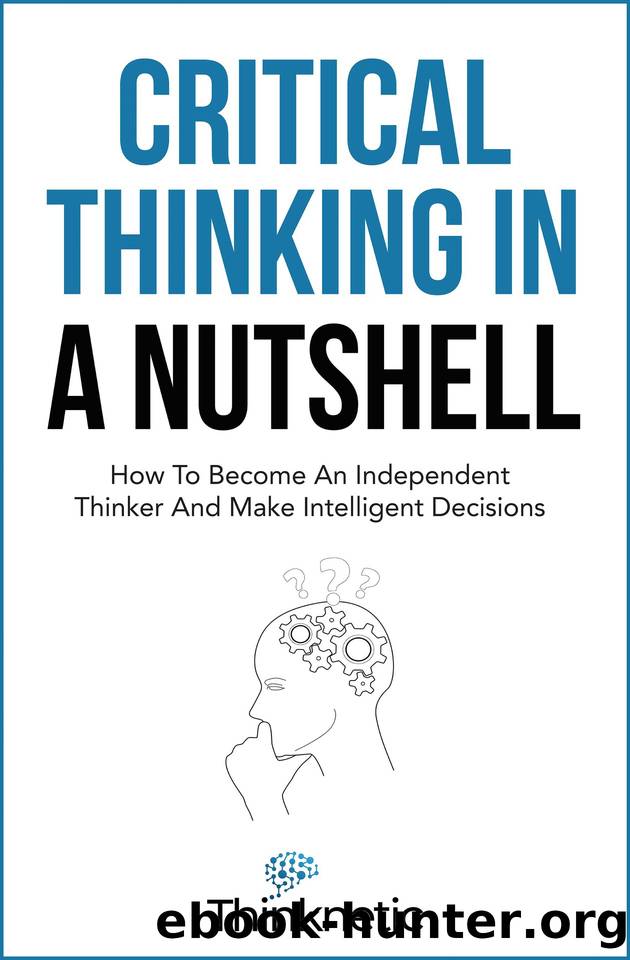Critical Thinking In A Nutshell: How To Become An Independent Thinker And Make Intelligent Decisions by Thinknetic

Author:Thinknetic [Thinknetic]
Language: eng
Format: epub
Publisher: Thinknetic
Published: 2021-04-14T16:00:00+00:00
4
Barriers To Critical Thinking
A n old air force maxim said, âif youâre not catching flak, youâre not over the target.â Experience taught the pilots that flying over a high-value target attracts enemy fire. With the limited means of target identification available at the time, the anti-aircraft fire intensity was a good indicator that the pilot was on the right track.
There was another element to this as well. It was considered manly to tough and bomb through enemy fire. The worst thing a bomber crew could do was avoid a tough target and try to dump the bombs elsewhere. Nothing could harm your reputation as an airman more than that.
On August 1, 1943, 177 allied bombers took off from Benghazi in Libya. Their mission was to bomb Nazi operated oil refineries in Romania. One of the formations involved was the 376th Bombardment Group of the United States Air Force.
The Group took a wrong turn and ended up over Bucharest, the capital of Romania. As they approached the city, they faced enemy flak fire. However, Commander Keith Compton saw conspicuously civilian looking buildings below him. He had to make a snap decision. Remembering the maxim, he decided to order the payloads dropped.
Just then, another squadron broke radio silence and warned of the mistake. Had they failed to intervene, they could have been responsible for the deaths of countless innocent lives. Commander Compton almost made a terrible mistake due to his preconceived beliefs.
The brave Commander almost fell victim to a common barrier to critical thinking: a prior unexamined belief.
As we will see in this chapter, beliefs, biases, intuition and certain emotions can be a barrier to critical thinking. However, with self-awareness, we can overcome these obstacles. Pay careful attention here, so you know what to avoid!
Beliefs
The costly mistake Commander Compton nearly made is an example of affirming the consequent. This logical fallacy occurs in two stages. First, a person believes that an outcome is likely to occur under specific circumstances. Second, when that outcome materializes, the same person assumes those preconceived circumstances were the cause of it [23] .
However, this is often a fallacy. A completely separate explanation may cause the outcome. The circumstances that led to the outcome in one instance may not apply in another.
In its most primitive form, the fallacy of affirming the consequent looks like this: Paris is in Europe. Therefore, if I am in Europe, I am in Paris. Fallacies this extreme are quite rare [24] .
Why do we make such costly mistakes? In a complex environment, we are unable to process all relevant information in real-time. Hence, we rely on simplifications to make quick decisions. In so doing, we rely heavily on unexamined beliefs we have accepted earlier in life [24] .
This tendency is completely human. However, when stakes are high, we cannot accept preconceived cultural assumptions. In these cases, identifying and examining our ingrained assumptions can be the difference between life and death.
Critical thinkers show a willingness to examine ingrained ideals thoroughly and objectively. Therefore, the ability to question even our most cherished cultural ideals is at the heart of critical thinking.
Download
This site does not store any files on its server. We only index and link to content provided by other sites. Please contact the content providers to delete copyright contents if any and email us, we'll remove relevant links or contents immediately.
What's Done in Darkness by Kayla Perrin(25499)
Shot Through the Heart: DI Grace Fisher 2 by Isabelle Grey(18218)
Shot Through the Heart by Mercy Celeste(18160)
The Fifty Shades Trilogy & Grey by E L James(17774)
The 3rd Cycle of the Betrayed Series Collection: Extremely Controversial Historical Thrillers (Betrayed Series Boxed set) by McCray Carolyn(13189)
The Subtle Art of Not Giving a F*ck by Mark Manson(12910)
Scorched Earth by Nick Kyme(11831)
Stepbrother Stories 2 - 21 Taboo Story Collection (Brother Sister Stepbrother Stepsister Taboo Pseudo Incest Family Virgin Creampie Pregnant Forced Pregnancy Breeding) by Roxi Harding(11040)
Drei Generationen auf dem Jakobsweg by Stein Pia(10216)
Suna by Ziefle Pia(10185)
Scythe by Neal Shusterman(9259)
International Relations from the Global South; Worlds of Difference; First Edition by Arlene B. Tickner & Karen Smith(8608)
Successful Proposal Strategies for Small Businesses: Using Knowledge Management ot Win Govenment, Private Sector, and International Contracts 3rd Edition by Robert Frey(8419)
This is Going to Hurt by Adam Kay(7693)
Dirty Filthy Fix: A Fixed Trilogy Novella by Laurelin Paige(6453)
He Loves Me...KNOT by RC Boldt(5804)
How to Make Love to a Negro Without Getting Tired by Dany LaFerrière(5378)
Interdimensional Brothel by F4U(5304)
Thankful For Her by Alexa Riley(5161)
